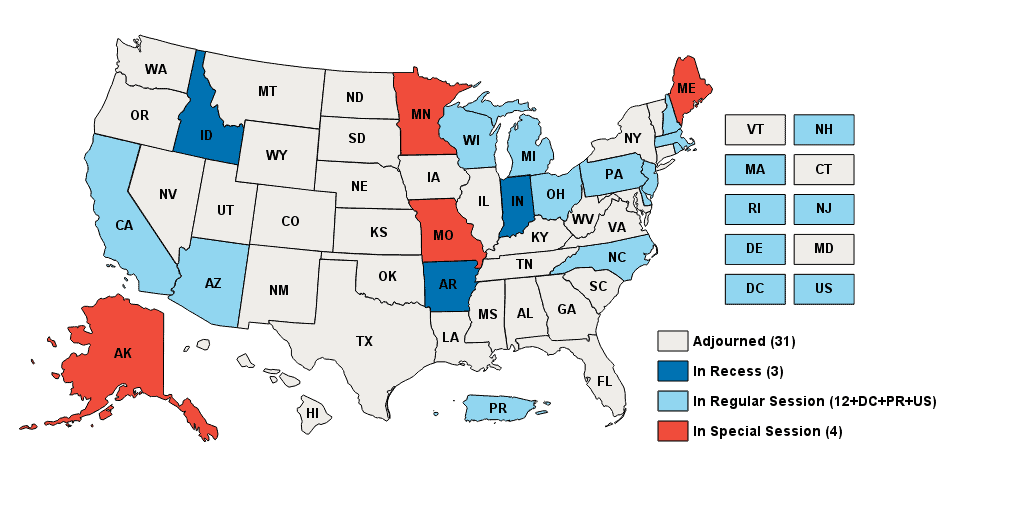STATE SESSIONS INFORMATION
Overview
Michigan, New Jersey, North Carolina and Pennsylvania are in regular session. The District of Columbia Council and U.S. Congress are also in session.
Ohio is in recess until November 13.
North Carolina passed an adjournment resolution that calls for the regular session to reconvene periodically through December. The legislature reconvened for a one day session on October 24 and is scheduled to next convene again on November 19.
Louisiana Republican Gov. Jeff Landry announced that he will call a special session in November to consider tax reforms. According to Yahoo News, Governor Landry hopes to overhaul the state’s current tax system by reducing income tax and charging sales tax on more items. In explaining his plan, Landry said it would “provide an immediate increase in take-home pay for every Louisiana taxpayer.” If the legislature approves of the tax reforms, they would then need to be ratified by voters next March before becoming law.
Delaware Democratic Gov. John Carney has 10 days from presentment, excluding Sundays, to act on legislation or it becomes law without signature. Massachusetts Democratic Gov. Maura Healey has 10 days from presentment to act on legislation or it becomes law without signature. New Hampshire Republican Gov. Chris Sununu has five days from presentment, excluding Sundays, to act on legislation or it is pocket vetoed. New York Democratic Gov. Kathy Hochul has 10 days from presentment, excluding Sundays, to act on legislation or it becomes law without signature.
Interim Committees/Prefiles
The following states are currently holding interim committee hearings: Alabama, Alaska, Arizona, Arkansas, California House and Senate, Colorado, Connecticut, Georgia, Hawaii, Idaho, Illinois House and Senate, Indiana, Kansas, Kentucky, Louisiana, Maine, Maryland, Minnesota, Mississippi House and Senate, Missouri House and Senate, Montana, Nebraska, Nevada, New Hampshire House and Senate, New Mexico, New York Assembly, North Dakota, Oklahoma House and Senate, Oregon, Rhode Island, South Carolina, South Dakota, Tennessee, Texas House, Utah, Vermont, Virginia, Washington, West Virginia and Wyoming.
The following states are currently posting bill drafts, prefiles and interim studies: Alabama, Florida, Iowa, Nebraska, Nevada, New Hampshire, North Dakota, Montana, Oklahoma House and Senate, Utah and Virginia.

